Women and the right to adequate housing
Special Rapporteur on the right to adequate housing
This page contains the following sections:
- Introduction
- Human Rights Standards
- Resolutions
- Guidelines
- Publications
- Tools and Brochures
- Statements by the Special Rapporteur
- Thematic reports by the Special Rapporteur
- Communications - Complaints
- Links
Introduction
The right to adequate housing is a central component of women’s right to equality under international human rights law. While international and national laws increasingly recognize women’s right to adequate housing, considerable gaps still exist between such recognition and the reality of large-scale denial of this right. As a result of discrimination and inequality in housing, many women and girls live in insecure, undignified and unsafe conditions, at increased risk of homelessness and violence. Forced evictions and other violations of the right to housing, disproportionally impact women and reinforce existing inequalities, representing a significant barrier to gender equality. Examples of gender-based inequality and discrimination include:
- Unequal property rights and security of tenure, often linking tenure to relationship or familial status, in particular in the event of dissolution of marriage, death of a spouse and during inheritance
- Discriminatory and unequal access to economic opportunity and financing for home ownership or rental
- Exclusion from participatory and decision-making processes in relation to housing and urban planning, contributing to housing conditions inadequately addressing the needs of women and girls
- Increased vulnerability of women and girls to acts of domestic violence and sexual abuse in particular when alternative safe housing is not available or when living in homelessness
- Lack of access to safe water, sanitary or other facilities providing privacy, including for menstrual health and hygiene
- Lack of monitoring of more ‘hidden’ forms of female homelessness
Gender discrimination is compounded by other forms of discrimination. For example, women with disabilities are more susceptible to violence in the home and less likely to have access to shelters or alternative accommodation. Realizing the right to adequate housing for all women requires taking into account all layers of discrimination, and taking concrete steps to address them.
Human Rights Standards
The International Covenant on Economic, Social and Cultural Rights states that States parties “[…] recognize the right of everyone to an adequate standard of living for himself and his family, including adequate food, clothing and housing” (art. 11.1), and that men and women have an equal right to enjoy this right (art. 3). In, addition, all States must guarantee the right to adequate housing without any discrimination of any kind, including in relation to sex (art. 2.2).
The Committee on Economic, Social and Cultural Rights clarified that rights to equality and to be free from discrimination are not subject to progressive realization, but entail obligations of immediate application, and that guarantees of non-discrimination and equality in international human rights treaties mandate both de facto and de jure equality (General Comment No.16 (2005), paras. 7 & 40).
The Convention on the Elimination of All Forms of Discrimination against Womenstates that: “States Parties shall undertake all appropriate measures to eliminate discrimination against women in rural areas […] and, in particular, shall ensure to such women the right […] (h) to enjoy adequate living conditions, particularly in relation to housing, sanitation, electricity and water supply, transport and communications”(art. 14.2). States have the obligation to ensure “the same rights for both spouses in respect of the ownership, acquisition, management, administration, enjoyment and disposition of property, whether free of charge or for a valuable consideration” (art. 16.1).
Housing must as well be safe, which includes protection of women and girls against domestic violence in accordance with the UN Declaration on the Elimination of Violence against Women. The Committee on the Elimination of All Forms of Discrimination against Women has recommended that States should in situation of violence against women “ensure access to financial aid, crisis centers, shelters, hotlines and medical, psychological and counseling services (General Recommendation No. 33 (2015), para 16.). Article 23 of the Istanbul Convention on preventing and combatting violence against women and domestic violence of the Council of Europe says that “[State] Parties shall take the necessary legislative or other measures to provide for the setting-up of appropriate, easily accessible shelters in sufficient numbers to provide safe accommodation for and to reach out pro-actively to victims, especially women and their children.”
The UN Declaration on the Rights of Peasants and other People Working in Rural Areas prohibits discrimination of women, the arbitrary and unlawful displacement from land and habitual residence, and the discrimination of women in relation to their right to land in Articles 4, 17 and 21.
Resolutions
According to the Commission on Human Rightsand the Human Rights Council, ”discrimination in law and practice against women with respect to having access to, acquiring and securing land, property and housing, as well as financing for land, property and housing, constitutes a violation of women’s human right to protection against discrimination”(CHR Resolution 2005/25 reaffirmed by HRC Resolution 43/14).
The Human Rights Council has furthermore urged States to “ensure women’s equal right to adequate housing as a component of the right to an adequate standard of living in all aspects of housing strategies, including through equal access to credit, mortgages, home ownership and rental housing, to take the safety of such housing properly into account, especially when women and children face any form of violence or threat of violence, and to undertake legislative and other reforms to realize equal rights for all with respect to property and inheritance.” (Resolution 43/14)
In 2020 the Human Rights Council urged States to ”ensure increase the to prevent and respond to the increase in violence against women and girls amid the COVID-19 pandemic, including by designating and expanding the capacity of domestic violence shelters as essential services and increasing resources for them, in collaboration with civil society and communities” (Resolution 44/17).
Guidelines
The Guidelines for the implementation of the right to adequate housing (2020)developed by the Special Rapporteur on the right to adequate housing, urge States in Guideline No. 9 to:
- Recognize the independent right of women to security of tenure, irrespective of their family or relationship status;
- Guarantee equal access to credit, mortgages, home ownership and rental housing, including through subsidies;
- Ensure in situation of household violence immediate access to emergency shelters and through legislation that, regardless of whether a woman has title, formal ownership or tenancy rights, she is able to remain in her own home where appropriate and have the perpetrator removed; and
- Guarantee the right of women to participate in all aspects of housing-related policymaking, including housing design and construction, community development and planning, and transportation and infrastructure (paras. 53-57).
Guiding Principle 6 of the Guiding principles on security of tenure for the urban poor (2014)calls upon States to strengthen and protect women’s security of tenure, regardless of age, marital, civil or social status, and independent of their relationships with male household or community members. They urge States among other:
- Adopt legislative and administrative measures to prohibit and eliminate discrimination against women by landlords, public housing providers and credit institutions;
- Register as well women’s names in tenure contracts and certificates;
- Eliminate, in consultation with communities, discriminatory practices in customary and religious tenure systems;
- Promote inheritance rights of women and girls;
- Prioritize safe emergency shelters to women and children in humanitarian emergencies. (paras. 60-65).
The Basic Principles and Guidelines on development-based evictions and displacement (2008) developed by the Special Rapporteur specify that
- States must ensure the equal right of women and men to protection from forced evictions (para 15.);
- Impact assessments must take into account the differential impacts of forced evictions on women, children, the elderly, and marginalized sectors of society (para. 33);
- All affected persons, including women should receive all relevant information prior to an eviction and should be able to participate in consultations and make proposals for alternatives to relocation (para. 39);
- States must take steps to ensure that women are not subject to gender-based violence and discrimination in the course of evictions (para. 47);
- Special efforts should be made to ensure equal participation of women in all planning processes related to relocation (para. 53);
- Resettlement must ensure that the human rights of women, children, indigenous peoples and other vulnerable groups are equally protected, including their right to property ownership and access to resources (para. 56);
- Women and men must be co-beneficiaries of all compensation packages. Single women and widows should be entitled to their own compensation. (para. 62)
Publications
OHCHR: Women and the Right to Adequate Housing (2012)
PDF: Arabic | Chinese | English | French | Russian | Spanish

This publication is based on the work of the Special Rapporteur on the right to adequate housing and her report (A/HRC/19/53). It provides an overview on normative framework relating to the right to adequate housing of women under international human rights law and on discrimination against women in the areas of housing, land and property. In addition, specific topics, such as inheritance, forced evictions, inadequate housing conditions for women and violence against women and housing are discussed. A comprehensive introduction to the topic.
OHCHR and UN Women: Realizing women’s rights to land and other productive resources (2020)

This updated 2nd edition provides guidance for lawmakers, policymakers and civil society organizations to support the adoption and effective implementation of laws, policies and programmes to respect, protect and fulfil women’s rights to land and other productive resources. The publication clarifies how women’s rights to land and other productive resources are relevant to the achievement of the 2030 Agenda for Sustainable Development, adopted by the United Nations General Assembly in 2015.
UN HABITAT and UN Women: Harsh realities: Marginalized Women in Cities of the Developing World (2020)
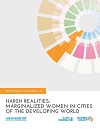
This analysis, based on data from 59 low- and middle-income countries in Latin America and the Caribbean, Central and Southern Asia, and sub-Saharan Africa, finds that women and their families bear the brunt of growing income inequality and failures to adequately plan for and respond to rapid urbanization. The data show that women are often overrepresented in informal settlements. At the root of this phenomenon are gender-based inequalities that limit women’s access to education, secure and durable housing, and asset ownership.
UN-Habitat: Women and Housing: Towards inclusive cities (2014)
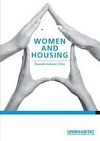
This publication explores the complex terrain of the often unrealized right to adequate housing of women and its negative implications for urban sustainability. It identifies a number of key areas that impede various women from enjoying their right to adequate housing. It introduces the conceptual framework of an intersectional analysis as a gender and diversity-inclusive way to examine and assess housing policies and processes so that the right to adequate housing, protection from forced evictions and sustainable human settlements may one day become a reality for all women and men.
Secretary-General: Women’s equal ownership of, access to and control over land and the equal rights to own property and to adequate housing (2002)
In 2002 the Secretary General submitted a report (E/CN.4/2002/53) to the Commission on Human Rights on this topic, summarizing responses received from Governments, UN bodies, international financial institutions and UN human rights mechanisms.
Special Rapporteur on violence against women, its causes and consequences: report on shelters and protection orders (2017)
The report (A/HRC/35/30) outlines key elements of a human rights-based approach to integrated services and protection measures on violence against women, with a focus on shelters and protection orders.
Tools and brochures
Questionnaire on women and adequate housing (2008)
This questionnaire (A/HRC/4/18, Annex III) was developed by the Special Rapporteur on the right to adequate housing for monitoring the right to adequate housing of women.
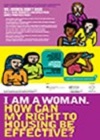
I am a woman. How can my right to housing be effective?
English | Portuguese | Español
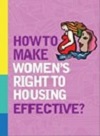
How to make women’s right to housing effective?
English | Portuguese | Español
Statements by the Special Rapporteur
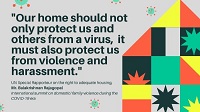
Statement to the International Summit on domestic/family violence during the Covid-19 pandemic, New York 19 November 2020
Statement | Video
Joint Statement on International Women’s Day 2020, 8 March 2020
Thematic reports of the Special Rapporteur
Several thematic reports of the Special Rapporteur on the right to adequate housing have focused on women’s rights. Below is a selection.
|
Report title and links |
Themes |
|
The report outlines how gender intersects with other issues facing indigenous peoples to create significant barriers to the enjoyment of the right to housing (paras. 45-47). These include:
|
|
|
The Special Rapporteur examines how women experience multiple systemic barriers to access to justice (paras. 49-50). She asserts that :
|
|
|
The right to housing for residents of informal settlements (2018) |
In this report the Special Rapporteur calls for the inclusion of women in all upgrading programs (para. 22), and to ensure that their specific needs are recognized and addressed (para. 48). In addition, she calls for the investigation and prevention of violence against women and girls in informal settlements, noting that water and services being located for from homes, lack of electricity and lighting, insecure housing and long-term poverty contribute to increased violence against women in these settings (para. 29). |
|
The Special Rapporteur states that human rights-based national housing strategies must recognize and be responsive to the unique housing experiences that result from intersection and compound discrimination by women (para. 39). She calls for gender-responsive budgeting, whereby national and local budgets are analyzed in terms of their differing impacts on the housing experiences of women, and fiscal decisions are taken that promote women’s housing equality (para. 75). |
|
|
The right to adequate housing of persons with disabilities (2017) |
The Special Rapporteur outlines how a lack of housing options for persons with disabilities often means that relying on informal support and family members is often their only option. In these situations, those providing support are usually women, who are frequently abandoned by spouses and required to relinquish possibilities of employment, leading to long term poverty (para. 26). |
|
Homelessness as a global human rights crisis that demands an urgent global response (2016) |
In this report the Special Rapporteur explains how definitions of homelessness exclude women with children who often seek shelter with family or friends, to avoid the severe repercussions associated with street life (para. 9). She also explores how women are at high risk of homelessness due to discriminatory customary and statutory laws on divorce, inheritance and property (para. 39). |
|
Report on Women and the right to adequate housing (2012) |
The Special Rapporteur looks at progress to date and further efforts needed to ensure that women everywhere are able to enjoy the right to housing in practice. Building on work previously done under the mandate, this report focuses on legal and policy advancements on various issues like inheritance, land and property, as well as strategies for overcoming gaps in implementation of those laws and policies. The report makes recommendations to States, United Nations agencies and human rights mechanisms on how to improve the enjoyment of this right for women worldwide. |
|
Women and the right to adequate housing, Final report (2006) |
In this report on women and adequate housing, the Special Rapporteur presents an analysis of several known obstacles to women realizing their full housing rights such as: homelessness; violence against women; discriminatory cultural and social norms; family or personal laws; privatization and affordability of housing; and the impacts of natural disasters, forced evictions and HIV/AIDS on women. The Special Rapporteur points out the need for States to strengthen national legal and policy frameworks for protecting women’s rights to adequate housing, land and inheritance, and provide avenues for redress where violations occur. |
Communications – Complaints
The Special Rapporteur on the right to adequate housing can consider complaints on alleged violations of the right to adequate housing, including in situations where such violations are likely to occur in the future. Such complaints are considered under the communications procedure of Special Procedures. Complaints can cover individual cases, but as well (draft) laws, policies and practices that may not be in conformity with the right to adequate housing. The Special Rapporteur may act on such complaints irrespectively whether the concerned State has signed or ratified a particular international human rights treaty or not. Complaints can be submitted online or by writing to srhousing@ohchr.org.
Communications sent by the Special Rapporteur to States or other stakeholders and replies received to them are published after 60 days.
After exhaustion of legal remedies at national level, individuals can also submit a complaint to a treaty body, monitoring a particular international human rights treaty, if the respective State has accepted to receive such complaints.
Links
- Special Rapporteur on violence against women, its causes and consequences
- Working Group on discrimination against women and girls
- Women's Rights and Gender main page
- Committee on the Elimination of Discrimination Against Women (CEDAW)
- Committee on Economic, Social and Cultural Rights (CESCR)
- UN-Habitat – Gender
- UN Women